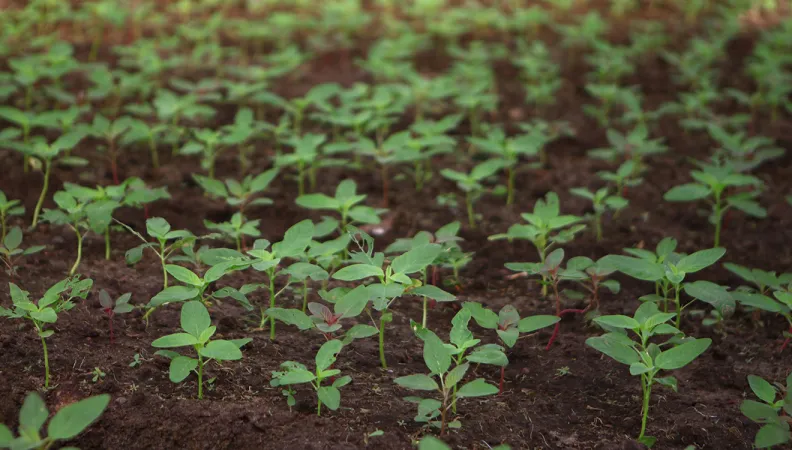Share the page
Working towards Food Security in West Africa: 5 AFD Group Projects
Published on

In 2023, nearly 43 million people will face food shortages in West Africa – four times higher than over the last ten years. In the approach to World Food Day on October 16, we focus on five AFD Group-backed projects that increase food availability and boost sustainable agricultural production.
Originally published on 15 June, 2023, this article was updated on 13 October.
For the first time since the 1970s, 45,000 people in the Sahel will experience catastrophic levels of hunger, which could lead to famine. Food security is again on the rise across the region, and the situation could worsen in the coming years, not least because armed conflict is taking its toll on a civilian population mired in a growing humanitarian crisis.
Although food production has steadily increased in recent years, population growth, land degradation and a number of shocks – from Covid-19 to the war in Ukraine, and spiraling inflation – are undermining food security in the region.
In the aftermath of the 2008 financial crisis, several countries and economic blocs mobilized to work towards food and nutritional security. The Economic Community of West African States (ECOWAS) for example, adopted a regional food storage strategy in 2012, with improved alert and response systems.
The current situation requires a similar mobilization because, even with improved production, demographic growth, land degradation and various shocks (climate, Covid-19, war in Ukraine, inflation) are posing enormous obstacles to food security across the region.
Food and nutritional security are based on four pillars: food availability, access to food, the stability of these two factors over time, and consumer use. AFD Group is working on all four fronts to support governments and regional organizations, together with technical and financial partners. It also contributes to strategic thinking on the changing nature of food systems and public policy dialogue in this area.
How does AFD group tackle food insecurity in west africa? Five projects give us an idea:
Regional food reserves in case of crisis
Countries struck by food shortages are increasingly calling upon the international aid system to address the unceasing growth in humanitarian needs. In response to the need to boost the region’s autonomy in response to food crises, a regional storage strategy was therefore adopted in 2012, combining the local stocks of villagers, national security stocks and the creation of a Regional Food Security Reserve (RFSR) to call on regional solidarity in the event of a major food crisis.
Through the project to support food storage, AFD is helping the Economic Community of West African States (ECOWAS) with the implementation of this strategy, which aims to strengthen West Africa’s capacity to manage food, nutritional and pastoral crises.
Further reading: AFD Intervenes to Tackle the Food Crisis
Improving food security by reviving irrigated agriculture in Mauritania
In Mauritania, the Asarigg project aims to improve food security for the most vulnerable people, restore the environment, reduce risks of land disputes, and strengthen social cohesion in six watersheds (Gorgol and Guidimakha regions). The project comprises a rapid action component entrusted to a group of French and Mauritanian NGOs (GRDR, GRET, Tenmya). It specifically aims to improve land productivity, irrigated agriculture support services, and the capacity of operators in the sector. Nearly 1,000 hectares of land have now been rehabilitated or developed and more than 500 women market gardeners have received support.
Supporting the production of fortified foods
Proparco, AFD’s private sector subsidiary, is supporting Nutriset, a company that produces Plumpy’Nut, a nutrient paste whose main ingredients are milk powder, peanuts, vegetable oils and sugar. This paste was created in 1996 and has revolutionized the management of severe malnutrition. Since 2005, Nutriset has been working to make this type of product readily accessible and available for vulnerable people through a network of producers called “PlumpyFields”. Proparco’s financing contributes to increasing the production capacity of this network of producers.
Further reading: “The Goal of Zero Hunger by 2030 will be hard to Achieve”
Nutrition and peacebuilding in the Lake Chad provinces
In February 2022, to accelerate the implementation of the Great Green Wall initiative, AFD launched a “Crisis and Post-crisis” call for projects for civil society organizations already operating in the 11 Great Green Wall countries. The objective is to prevent and mitigate conflicts related to human and climate effects on natural resources by increasing the resilience of food systems.
One of the projects selected is led by CCFD-Terre Solidaire, the goal of which is to improve food and nutritional security for people in the Chari Baguirmi, Hadjer-Lamis and Lac provinces, while backing efforts to prevent and resolve conflicts caused by competition over access to natural resources. The project aims to promote the peaceful and sustainable management of agro-pastoral resources; support the economic development of targeted areas by strengthening family farming (and the participation of women and young people); promote the dissemination of good practice in agro-ecology.
Supporting school canteens with short supply chains in Senegal
AFD Group is supporting school canteens (link in French) in 47 schools across Senegal, by providing meals for nearly 9,000 children to improve food and nutritional security – and therefore their learning conditions. With the schools linked to short supply chains, the canteens are mainly supplied by local operators, from farmers’ organizations to groups of women processors.
